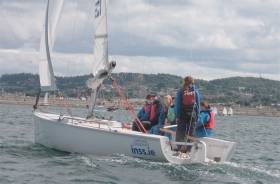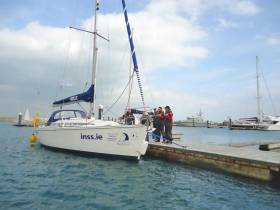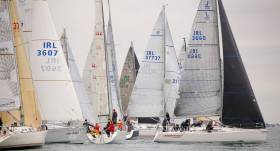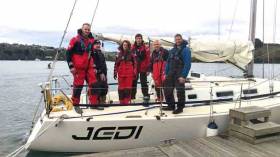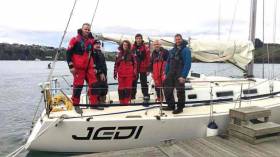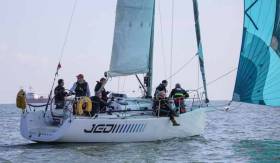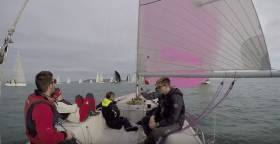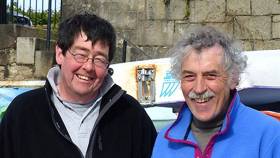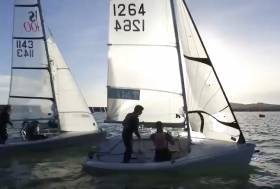Displaying items by tag: INSS
#TrySailing - Sunday 14 May is the date for the Irish National Sailing & Powerboat School’s 2017 Open Day — where anyone can try sailing, kayaking or paddleboarding at Dun Laoghaire Harbour for only €10.
All ages are welcome on the day, whether families, friends or individuals, for what promises to be an exciting day on the water — coinciding with the annual Sail-a-thon charity event organised by sailors attending the INSS junior club sailing programme.
Whether you’re entirely new to the sport or rekindling an old flame, you’ll be learning how to sail on board one of the school’s fleet of 1720 sportsyachts — waterproof overalls and lifejackets provided!
Those interested in kayaking and paddleboarding, meanwhile, will be guided around the sheltered waters inside Dun Laoghaire Harbour to give a taste of what makes these activities so appealing.
Details on booking a session for the day can be found on the INSS website HERE.
Day Course On Mooring & Handling Yachts Under Power
#HowToSail - A new series of short yachting courses at the Irish National Sailing & Powerboat School (INSS) begins with a one-day course on various techniques for mooring and handling a yacht under power.
This day-long course (9.30am-5pm) will run three times over the summer, with the first on Sunday 7 May, and covers the following topics:
- Basic engine checks
- Throttle and gear controls
- Rudder, propellers, propwalk and pivot points
- Going ahead and astern
- Use of wind and stream to aid manoeuvres
- Manoeuvring in confined spaces
- Moving to and from a marina berth under power
- Use of springs and other berthing techniques
The €99 course is recommended for any sailors heading abroad over the summer months who want to brush up on moving about tighter spaces, or those thinking about doing an ICC assessment.
Royal Irish Yacht 'Juggerknot' Takes ISORA Race Win Off Wicklow
Royal Irish's Andrew Alego made an impressive ISORA debut yesterday in a tricky light wind race from Dun Laoghaire to Wicklow. The new–to–the Bay, J109 Juggerknot port–tacked a 24–boat fleet in very light airs off the Dun Laoghaire startline.
In yet another impressve performance for the design, J109s took the top four places in the 25–miler. Second was Tim Goodbody's White Mischief also from the Royal Irish Yacht Club and third the Irish National Sailing School's Jedi skippered by Kenny Rumball.
Light winds prevailed for much of the morning, so it was a slow race that ultimately meant only two–thirds of the Dun Laoghaire fleet finished off Wicklow Sailing Club yesterday afternoon. Eight boats were recorded as 'Did Not Finish'.
The fine turn out of 24 boats at Dun Laoghaire is a reversal of fortunes for the Dublin offshore sailing scene and follows similar lifts in numbers in 2015 and 16.
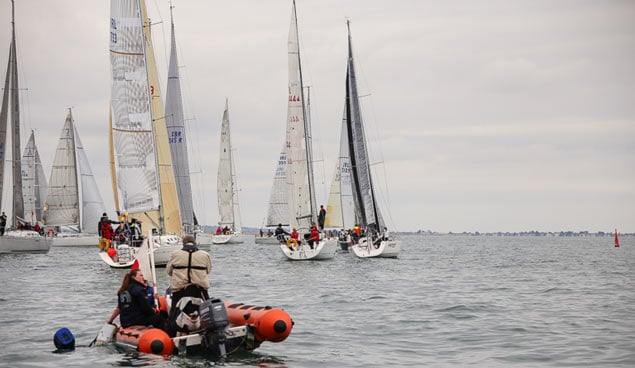 With under a minute to the start, the 23–boat was shy of the Dun Laoghaire line. Race winner Juggerknot is closest and preparing to flip onto port tack for the Burford buoy Photo: Afloat.ie
With under a minute to the start, the 23–boat was shy of the Dun Laoghaire line. Race winner Juggerknot is closest and preparing to flip onto port tack for the Burford buoy Photo: Afloat.ie
Back in 2007, the then ISORA Chairman John Rose gave notice to nine clubs on both sides of the Irish sea that November's agm would be the last citing a "lack of interest".
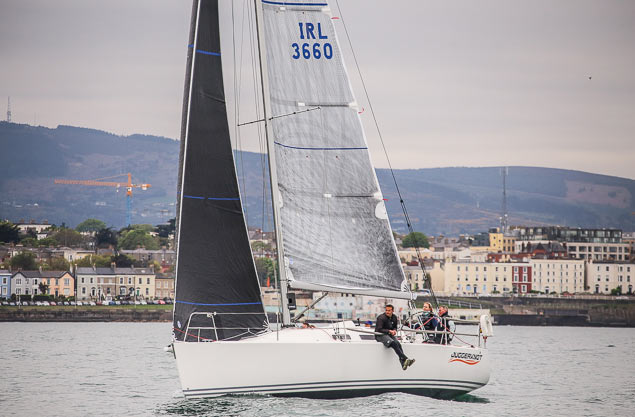 New ISORA entrant – Juggerknot from the Royal Irish Yacht Club
New ISORA entrant – Juggerknot from the Royal Irish Yacht Club
A decade later, thanks to efforts to rekindle the offshore fleet on both sides of the Irish Sea, yesterday's first race of the 2017 calendar amassed a buoyant fleet of 37 with 13 boats racing simultaneously from Pwllheli in North Wales. It is a satisfying result that ISORA Chief Peter Ryan says he is determined to build on. 'This size fleet has not been seen in ISORA for many years' he told Afloat.ie
The first race of the Overall ISORA Avery Crest Offshore Championship 2017 was also the first race in the ISORA Viking Marine Coastal Series 2016 and the Royal Alfred Coastal Series 2016. The weather forecast for the race was for little or no wind leaving a very difficult task for the Sailing Committee to set the course.
This first race saw the appearance of some new boats to ISORA. Tim Goodbody’s J109, “White Mischief”, Jonathan Bourke’s J109, “Dear Prudence”, Larry Power’s First 31.7, “Kalamar”, Brian Hett’s Dufour 40, “Oystercatcher”, Andew Algeo’s J109 “ Juggerknot”, Robert Rendell’s XC45, “ Samaton” and Jim Schofield’s Nicholson 32, “Thisbe”. Paul Egan and Colm Buckley have returned to the ISORA fleet with new boats First 35, “Platinum Blonde” and J109, “Indian”. “Jedi” J109 has changed owners and has returned to ISORA with Kenneth Rumball.
With the forecast of 3-7 knots NW veering and decreasing 2-3 knots E and veering later to 3-7 knots S, setting a course that would get most boats finished was always going to be difficult. The Race Committee set the course shortly before the start to: Start in Dun laoghaire – South Burford (S) – North and Finish in Wicklow – a course of 22 miles.
The winds at the start were light north-easterly as the fleet of 24 boats headed off towards the first mark in the south going tide. Fluky winds and conditions at the start made it difficult for many of the boats to get fast off the start line. “Juggerknot” and “Lively Lady” led the fleet that turned out to be a beat or tight fetch to the first mark.
Shortly after rounding the first mark, the boats headed in a run down towards the finish with the south going tide. In the decreasing winds and strong tide rounding the South Burford proved to be difficult and split the fleet. The front bunch led by “Lively Lady” drifted towards Wicklow in the fickle winds.
The winds continued to decrease and shift making progress very slow. While the fleet never stopped, at time it was only the south going tide that provided progress for the fleet. The leading buch also included, “Tsunami”, “Platinum Blonde”, “Jedi”, “Aurelia”, White Mischief”, “Dear Prudence” and “Another Adventure”.
As the wind had veered to the south east and increased slightly at the same time as the tide was turning north, “Juggerknot” crossed the finish line first to take 1st in IRC Overall and Class 1 and 2nd in ISORA ECHO Overall and Class1. “Jedi” too 1st in ISORA ECHO while “Albireo” took Silver Class.
16 of the 24 boats finished and made their way into Wicklow harbour for the usual ISORA après sail get together at WSC, some in time to see the “Munster match”!! Crews gathered in the club and planned their next ISORA adventure.
As the race was tracked using the Avery Crest Trackers, the progress of the race can be re-played using the YB app or on the ISORA website.
The next race is the first offshore on the 13th May from Holyhead to Dun Laoghaire. It is hoped that there will be another large combined fleet taking part in preparation of the D2D race in June and the Fastnet race in August.
Full results here
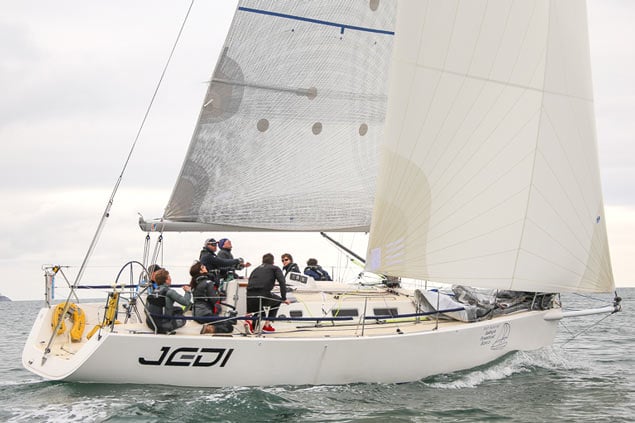 The INSS J109 Jedi, the only boat to set a gennaker from the Dun Laoghaire start was third in the race to Wicklow. Photo: Afloat.ie
The INSS J109 Jedi, the only boat to set a gennaker from the Dun Laoghaire start was third in the race to Wicklow. Photo: Afloat.ie
Go north for decent sailing breezes.....that’s the message being brought home by the Galway crew of the Irish National Sailing School’s J/109 Jedi as they continue to benefit from much firmer mainly westerly winds over the north of the country writes W M Nixon.
They are now speeding down the Irish Sea within 50 miles of their start/finish point in Dun Laoghaire, on track and sailing at 6.8 knots in best J/109 style. This should keep them a whole day within their self-imposed target of getting round Ireland in a clockwise direction within a week.
But while they may look like staying within one limit, they’ve already exceeded another in style, as their declared target of raising at least €3,000 towards helping the 85 patients receiving Cystic Fibrosis treatment in Galway University Hospital has been swept aside.
They went through the €3,500 mark while breezing along the north coast last night. And as the fund-raising stays open until mid-August, who knows what stratospheric total might be possible for this effort led by Mossy Reilly & Paddy Shryane, with full support from their crew of Dave O’Connor, Louis Cronan, Sophie Skinner, and Jonathan Curran.
Not only has it all been in a very good cause, but they return to Dublin Bay inspired by the magnificence of our coastline and the hugely varied life of sea creatures of all types and sizes to be seen and admired when making the incomparable circuit of Ireland.
Sailing Circuit of Ireland for Cystic Fibrosis Fund-Raiser
After a winter which included training with Irish National Sailing School in Dun Laoghaire, Galway’s Mossie O’Reilly and Paddy Shryane are well into a clockwise Easter circumnavigation of Ireland to raise funds for Cystic Fibrosis writes W M Nixon.
Spurred on by the death from CF last summer of their friend Eva Davin aged just 32, the Galway duo are sailing fully-crewed on the INSS’s J/109 Jedi. They aren’t trying to break any sailing records, but instead are doing the classic Round Ireland circuit in a way with which most sailors will identify. This in turn will, they hope, draw attention to the remarkable work being done in Galway University Hospital, where 85 children and adults are receiving treatment for CF.
Even before their venture got under way from Dun Laoghaire in the first minute of Holy Saturday, April 15th, they and their team had already raised €2,545 towards a modest target of €3,000 which we hope will be significantly exceeded by the time fund-raising ends of August 15th 2017. Because the voyage target is simply to get round Ireland, when total calm descended off Kinsale they dropped into port for a few hours until the wind returned.
INSS J109 Available for Dun Laoghaire Regatta Charter
The Irish National Sailing School J109 yacht is available to charter for Volvo Dun Laoghaire regatta and other Irish sailing events this season.
Jedi is a highly competitive J109 yacht and part of DBSC's ultra–competitive Class One fleet of 20 boats on Dublin Bay.
Regular readers of Afloat.ie will know the J109 class in Ireland needs no introduction, the cruiser racer offers exciting and exhilarating sailing yet in a very user friendly and comfortable package.
Jedi is, according to the INSS's Kenny Rumball, 'a perfect example of the J109 having undergone an extensive refit over the winter of 2016-2017 to make her possibly the most IRC optimized J109 available in Europe'
Download the INSS spec sheet below
Irish National Sailing & Powerboat School Starts Christmas Wrap–Up
You would be forgiven for thinking that in the marine industry, especially with a business that is mostly on the water, that the winter would be long and dark with little activity. This Autumn has been one of the busiest for the Irish National Sailing & Powerboat School. However, as Centre Principal Kenneth Rumball reports, the school is now finally able to start thinking about taking a break.
Last Saturday saw the finale of our Junior Club sailing with nearly 200 young sailors taking to the water every Saturday from September through till December. Parents were invited in for a glass of mulled wine and a mince pie to allow them talk to the children’s instructors about how they are progressing. There was also the RS Super Series which saw 8 RS 200s and 400s racing last Saturday morning. Marty O’Leary still holds the top spot but Kenny Rumball and Brian Byrne are hot on his heels after having enough time to compete in all the races.
Our fleet of yachts were nearly able to take a break however Beaufort Venture our cruising boat was called into action for a four part RTE drama shot in Dun Laoghaire Marina during the week. We will be wrapping up our final few courses this week and weekend with our school groups wrapping up for 2016 and not forgetting our race training group will be racing in the final race of the DBSC Turkey Shoot this coming Sunday.
Arthur Rumball 1961–2016
When we remember that Arthur Rumball was one of the definitive backroom boys of the Irish maritime world, it is remarkable and heart-warming to reflect on just how many lives he influenced for the better, and how many young people – aspiring sailors and would-be boatbuilders alike – he helped guide towards sailing and career fulfillment.
In his professional life, his work lives on in Viking Marine, while he was the main force in keeping the Irish National Sailing School’s fleet operational. In any size of business operation functioning within the challenges and restraints of the Irish market and our sometimes decidedly quirky sailing world, that would have been a demanding task. But these days the INSS fleet numbers 250 vessels in all, ranging from tiny dinghies up to 1720s and three fully-fledged offshore yachts. Yet in each case, Arthur could be relied on to assess exactly the right level of maintenance and finish required to keep the boat at the optimum level for the task for which it was required, and he did it with a minimum of fuss utilising sometimes very basic facilities.
He was the younger brother of INSS’s founding father Alistair Rumball by seven years, but as there were only the two siblings in this Malahide sailing family, inevitably they shared many experiences, although their sailing careers were to diverge during the period when the age gap seemed at its widest.
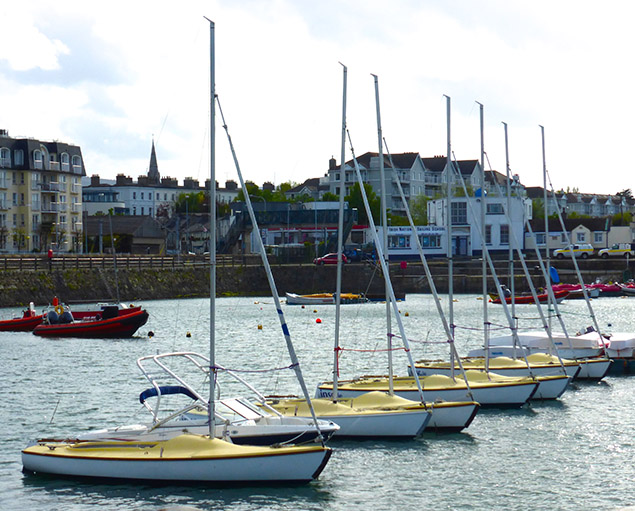
However, after Alistair began operations with the Irish National Sailing School with a sailing dinghy or two launching from the public slip in the Coal Harbour in Dun Laoghaire in 1974, Arthur helped now and again on a part-time basis, but by 1980 he was working with Alistair full-time with the INSS and their retail outlet Viking Marine.
Much and all as the brothers had enjoyed an idyllic Malahide childhood, as they both had business training they readily accepted that the greater density of population and affluence meant that any commercial sailing school, with its supporting shop, would have to be Dun Laoghaire-based. Over the years they have introduced thousands of people to sailing in a friendly, non-fussy way which nevertheless turned out hundreds of competent sailors, and reached a new height in 2016 when the INSS’s Reflex 38 Lynx – skippered by Alistair’s son Kenneth - was the top school boat in the Volvo Round Ireland Race, placing 10th overall in a very competitive fleet of 63 boats.
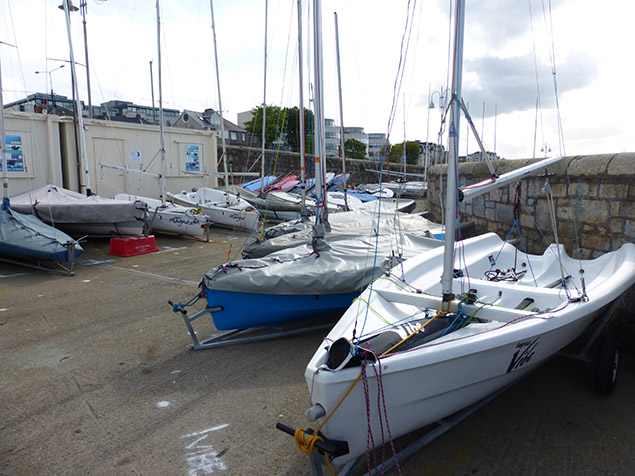

But that was only the peak of an astonishingly varied range of activities, all of which were supported by the ready availability of a fleet of boats whose maintenance Arthur oversaw and took an active involvement in working with. Indeed, there were few in the Irish boat-building and repair business who could rival Arthur’s breadth of experience and ability. His determinedly can-do approach – a Rumball family characteristic – was as inspiring ashore as his colleagues efforts afloat were in developing a practical “get-on-with-it” attitude to boats among those who benefitted from the INSS experience.
Despite his busy life around boats, Arthur had other interests and a very complete home life with Amanda and their three children, now all in their twenties. When it became known some time ago that he was battling gallantly with cancer, the thoughts of many worldwide were with him. And a shared hope was raised when it was known that the cancer had been cleared, even though a long struggle lay ahead for his weakened body to re-build itself.
Until a week ago, the outlook was promising, but then his condition suddenly deteriorated, and on Sunday, Arthur Rumball slipped quietly from among us all too soon at the age of 55. Our heartfelt condolences are with his family at this great loss which we share with his many friends, whose feelings have been best expressed both by Nick Bendon and his team in CH Marine, and by former colleague and pupil Rory Kelleher in Seattle.
From CH Marine, the message was: “From those early pioneering days of Dublin Boat Shows and Viking Marine, we always enjoyed his friendship and support, and while not wanting to use the word “legendary” too lightly, Arthur was that in our eyes, and a larger-than-life figure in the marine industry. This is the passing of a whole era, and we will miss him very much”.
Rory Kelleher spoke from the heart in a message to Alistair Rumball: “Please understand that he lives on in me, by the skills that he taught me. He is – as you are – one of the stones in the foundation of my life. And for that I am very grateful”.
WMN
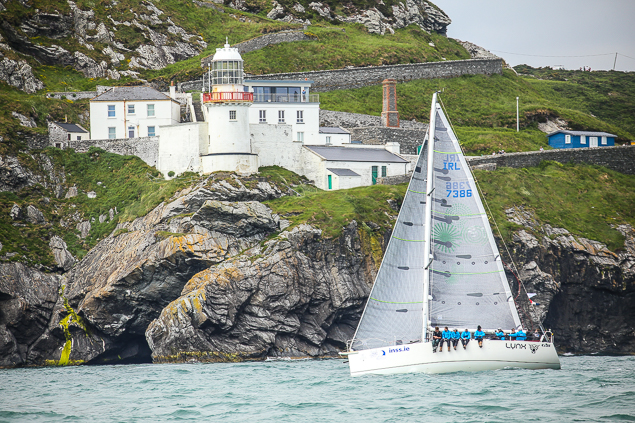 A long way from a sailing dinghy or two being launched from the public slip in Dun Laoghaire in 1974 ……the Irish National Sailing School’s Reflex 38 Lynx at the start of the Volvo Round Ireland Race 2016, in which she was winning sailing school boat, and tenth overall in a fleet of 63
A long way from a sailing dinghy or two being launched from the public slip in Dun Laoghaire in 1974 ……the Irish National Sailing School’s Reflex 38 Lynx at the start of the Volvo Round Ireland Race 2016, in which she was winning sailing school boat, and tenth overall in a fleet of 63
O'Leary Leads RS INSS 'Super Series' At Dun Laoghaire
Eight RS dinghies made it on the water at Dun Laoghaire Harbour for the first of a five one day monthly race days 'Super Series' hosted by the Irish National Sailing Club working closely with the RS Committee.
The series is aimed to be run in a sprint like fashion, with a target of eight races per day. On Day one, seven races were achieved with sailors off the water by 12:30, cold but sunny! Overall Marty O'Leary and Racel Williamson lead from Barry McCartin and Simon Doran. Results downloadable below
New Offshore Racing Course To Encourage ISORA Participation
Building on the growing numbers in the ISORA racing throughout the last season and in response from boat owners and crews alike, the Irish National Sailing and Powerboat School has announced an all new programme for ISORA and sailors all over the country. There is both a shorebased and practical element to the Dun Laoghaire course which can be taken independently or save costs by booking as a group.
The course aims, to enable skippers and crew to have the information and skills required to safely skipper a yacht on the common ISORA long distance passages within the Irish Sea by both day and night. The course will incorporate elements from the RYA Cruising Scheme Courses and will also include passage planning and navigation by modern chart plotters and other portable e navigational equipment such as iPad and laptop.
The Practical Course will be dynamic and can be adjusted to suit the direct needs of the clients on the differing courses. The fundamental aim of the Practical section of the course will be to give the clients the ability and the confidence to safely execute a typical ISORA race passage. Suitable for skippers and crew alike, the course will take place on an INSS race boat such as the Reflex 38, LYNX or the the school's recently acquired J109 Jedi, both styles of boats being keen competitors on the ISORA circuit.



























